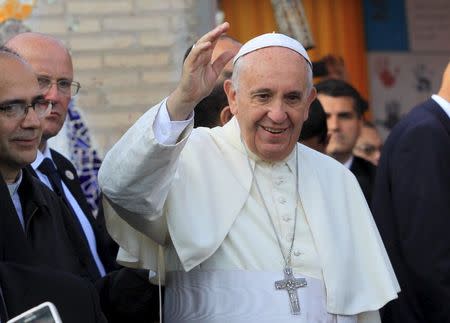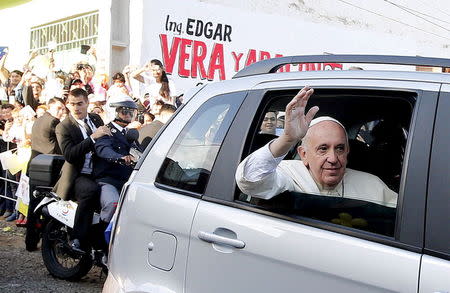Pope closes South America trip urging youths to 'make a mess'
By Philip Pullella and Daniela Desantis ASUNCION (Reuters) - Pope Francis left for Rome on Sunday at the end of a trip to South America during which he censured capitalism, championed the rights of the poor, warned of irreversible damage to the planet and urged youths to "make a mess". In passionate speeches, the Argentine pontiff urged the destitute to change the world economic order and branded the unfettered pursuit of money as the "dung of the devil". He also sought forgiveness for the sins committed by the Catholic Church against native Americans during the colonial era. At a final rally in Paraguay, Francis urged tens of thousands of youths to look after their less fortunate peers and fight for a dignified life filled with hope and strength. "They wrote a speech for me to give you. But speeches are boring," the Argentine pontiff said to loud cheers, casting aside his script. "Make a mess, but then also help to tidy it up. A mess which gives us a free heart, a mess which gives us solidarity, a mess which gives us hope." It was not the first time Francis has called on young people to shake things up, repeating a mantra he voiced in Brazil in 2013 when he urged youngsters to demand a more outward-looking Catholic Church. "We don't want young weaklings. We do not want young people who tire quickly, who live life worn out with faces of boredom. We want youths with hope and strength," Francis told the crowd, as night fell over the banks of the Paraguay River outside the capital Asuncion. Earlier on Sunday the pope heard harrowing tales of life in a flood-prone shantytown and appealed to the slum dwellers, many forced from their farms and now squatting on city land, to stay united in their struggle for better living and working conditions. The Argentine pontiff made defending the poor a major theme of his "homecoming" trip, which also took him to Ecuador and Bolivia, ranked among Latin America's poorest countries. On Saturday night, he said world leaders charged with promoting economic development must ensure it had a "human face" and denounced corruption as the "gangrene of society". In Banado Norte, murals adorned the walls of houses made of corrugated metal, wood and cement blocks. One of them read: "Yes to life, no to drugs, fight for change." "We built our neighborhoods inch by inch, overcoming difficult terrain, floods and hostile public authorities," ," Maria Garcia, a local organizer, told him. "It's been a tough fight to put up a home in the midst of hardship, but we never gave in nor let ourselves be swept away by sadness." HUMAN DIGNITY From Banado Norte, the pope went to hold a mass for more than a million people in a disused air base. The altar's backdrop was designed by a local artist who used corn cobs, coconuts, squashes, beans, seeds and other local produce to create huge murals of St. Francis of Assisi, from whom the pope took his name, and St. Ignatius of Loyola, the founder of the Jesuits, the religious order to which he belongs. Argentine President Cristina Fernandez flew in to attend the mass and greeted Francis at the altar at the end of the service. She and Francis had a tricky relationship when he was an archbishop, because of his criticisms of corruption and their differing views on social issues like gay marriage. Francis has used two major speeches on his trip to excoriate unbridled capitalism and champion the rights of the poor. In Bolivia on Thursday, he urged the downtrodden to change the world economic order and called for the poor to have the "sacred rights" of labor, lodging and land. On Saturday he urged politicians and business leaders "not to yield to an economic model which is idolatrous, which needs to sacrifice human lives on the altar of money and profit". Food and shelter were essential to human dignity, he said. In a foretaste of his September trip to the United States, Francis said in Ecuador, a biodiversity hot spot, that protecting the environment was no longer a choice but a duty if the world wanted to save the planet from ruin. (Editing by Richard Lough and Eric Walsh)



